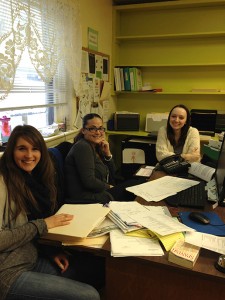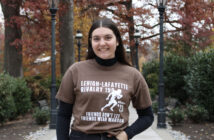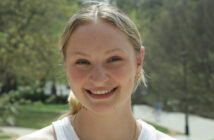
Brittany Klimek, ’16, Community Resource Coordinator Bennie Khamneh, and Jessica Consalvo work with the HMS internship program. (Courtesy of Brittany Klimek)
Since January, Lehigh’s first Health, Medicine and Society Health Equity Internship has provided four undergraduate students with the opportunity to work in collaboration with the Hispanic Center Lehigh Valley and St. Luke’s Health Network in an effort to combat health disparities plaguing the South Side.
For Brittany Klimek, ’15, a psychology major pursuing a minor in health, medicine and society, the internship continues to equip her with skill sets that she hopes will be applicable to her future career.
“Each of us are assigned to a different project and mine is the community empowerment program,” Klimek said. “Being a psychology major, you don’t really get internship positions. I want to go into clinical psychology and since health, medicine and society is my minor, I wanted to do something more than your typical classroom setting.”
Klimek’s community empowerment program is divided in to two branches, one based in the Hispanic Center, and the other centering around Donegan Elementary and Broughal Middle School. While Klimek’s work at the Hispanic Center has consisted of creating a more effective recording and database collection system, she is also trying to address the attendance issue in schools, which has become an emerging focus of concern. By shadowing the community empowerment program coordinator in schools, Maria Rodriquez, Klimek conducts her independent research based on what she had observed.
“What we found in school systems is that it is difficult to engage parents and get them to answer calls,” Klimek said. “The hardest part is getting the community to be willing to open up. I’m in the process of setting up interviews with as many parents as we can get a hold of to see their attitudes toward the school system and beliefs of attendance and whether they have had bad experiences with education.”
While other interns at the Hispanic Center, Jessica Consalvo and Mary Samuels, work on the food pantry and diabetes management programs respectively, Lydia Hunt, ’15, is the only one at St. Luke’s Hospital. As pharmaceutical chemistry major, Hunt’s internship position at St. Luke’s Dental Clinic aligns with her plans of going to Stony Brook School of Dental Medicine after graduation.
Hunt said she shadows mobile dental vans and was part of a project that is trying to find out why students aren’t being seen by dentists when they have insurance that covers dental care. She said she also worked to figure out the budget for an HIV grant, and is currently working on a project for tobacco cessation.
In addition to revising the tobacco questionnaire to include more social factors, Hunt said that trust between patient and doctor plays a significant role in solving health barriers and believes that issues with communication need to be further addressed.
“I’ve found that when you hand someone a piece of paper and they’re doing their health history, they are just checking boxes,” Hunt said. “If you are talking to them you could realize how bad their habit is and make them stop and think about it. On paper, they don’t have that realization.”
Similar to Klimek, Hunt said that the hands-on experience she gains is one of the reasons she is involved in the internship.
“I’m happy to have this opportunity as an undergrad because in dental school I won’t have time to focus on the patient aspect,” Klimek said. “I’ve read about health disparities in books and articles but I’ve never seen it in person. I could say something to my mentor and she will listen to me and treat me as an adult. The people who work there recognize our ideas are at the same level.”
Lorna Velazquez, the executive director of the Hispanic Center, said the internship program instills not only cultural awareness in students, but also provides social and economic exposure.
She said that in a psychology class, students only learn about how people behave and think, but they receive a different perspective to understand and help people when they get to see it in person.
The expertise and skill sets of different interns help make the center more efficient, such as with data collection, so that supervisors can focus on the improvement and expansion of programs, Velazquez said.
“My favorite part is seeing students blossom and you can tell that when they leave they know they’ve made a difference,” Velazquez said.





Comment policy
Comments posted to The Brown and White website are reviewed by a moderator before being approved. Incendiary speech or harassing language, including comments targeted at individuals, may be deemed unacceptable and not published. Spam and other soliciting will also be declined.
The Brown and White also reserves the right to not publish entirely anonymous comments.